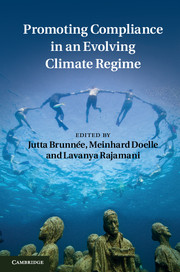Book contents
- Frontmatter
- Contents
- Contributors
- Preface
- Abbreviations
- Introduction: The role of compliance in an evolving climate regime
- Part I Context
- 1 The emerging post-Cancun climate regime
- 2 Promoting compliance with multilateral environmental agreements
- 3 Compliance regimes in multilateral environmental agreements
- Part II The Kyoto compliance system: Features and experience
- Part III Compliance and the climate regime: Issues, options, and challenges
- Part IV A look forward
- Bibliography
- Index
- References
1 - The emerging post-Cancun climate regime
Published online by Cambridge University Press: 05 January 2012
- Frontmatter
- Contents
- Contributors
- Preface
- Abbreviations
- Introduction: The role of compliance in an evolving climate regime
- Part I Context
- 1 The emerging post-Cancun climate regime
- 2 Promoting compliance with multilateral environmental agreements
- 3 Compliance regimes in multilateral environmental agreements
- Part II The Kyoto compliance system: Features and experience
- Part III Compliance and the climate regime: Issues, options, and challenges
- Part IV A look forward
- Bibliography
- Index
- References
Summary
Introduction
Discussions and negotiations regarding the post-2012 international climate change regime have been underway for many years. As the negotiations on the Bali Action Plan were launched in 2007 and the Kyoto Protocol’s first commitment period got underway in 2008, the core elements of a future regime started to emerge, although the overarching architecture remained rather elusive. There is still, of course, a lack of clarity on the future of the Kyoto Protocol and the core question of the final legal form of the ongoing negotiations under the UN Framework Convention on Climate Change (FCCC). However, the Cancun Agreements of 2010 offer some clarity on which elements of the regime are going to be included, no matter which ‘agreed outcome’ on legal form is decided in the end. Focusing in on the details of the Cancun Agreements, while the legal form questions continue to be sorted through, will allow countries to begin to have certainty around the pieces they must implement and to understand which commitments other countries in the agreements will have to fulfil in the years to come.
In the broader sense, understanding the key functions of what various institutions and processes need to provide for an effective international climate regime is emerging as an important question to answer. Such understanding and clarity would assist in focusing on which functions the FCCC should fulfil versus those that could be fulfilled through other plurilateral (e.g. G-20, Major Economies Forum) or bilateral arrangements. Due to the collective action and historical responsibility elements of the climate change problem, it would seem appropriate that the FCCC functions include at least collective ambition, equity, and transparency and accountability. The UN is the only forum which includes almost all countries on earth, thus providing each country with a voice in the decision-making. It is also the only forum where overarching ambition and equity are discussed. The Cancun Agreements, while not discussing these functions explicitly, do begin to address them. Further clarity is likely to emerge in Durban, South Africa – host of the next Conference of the Parties (COP) in 2011. Optimally, various institutions and processes would leverage off of each other, each playing an important function in achieving the ultimate objective of the FCCC, to avoid dangerous climate change.
- Type
- Chapter
- Information
- Promoting Compliance in an Evolving Climate Regime , pp. 17 - 37Publisher: Cambridge University PressPrint publication year: 2011
References
- 1
- Cited by



